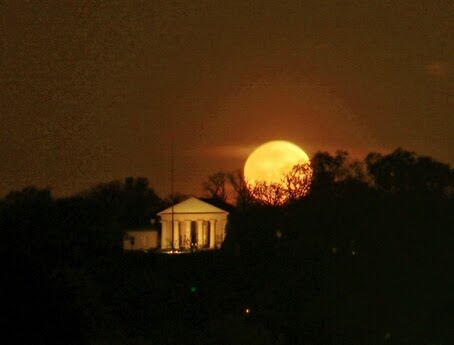 |
Moonset, Arlington House, Virginia
Photo by The Washington Post |
Not all stars are in the sky. Some are within us.
The last few mornings, if you were up early enough, like I was, you would have seen the moon setting on the western horizon.
The moon was nearly full, and rose in the east soon after sunset, and the moon gradually rose in the night sky, glowing white above us.
As we slept, the moon arched toward the western sky horizon.
Then the moon dimmed to orange as it sank in the western sky, glowing like the sunset of a few hours earlier, but not in a way that blinds us when we look into it.
The moon is a reminder that the brightness of the sun is with us even in the darkness of the night.
I’d like to think that is what Epiphany is about – a reminder that the Holy still glows even on these dark, dreary cold winter nights.
You can’t look into the sun without blinding yourself. Sometimes the holy is like that, too. But you can look at the moon all night long if you like. Sometimes these fainter reminders of the holy are easier for us to see, too.
In the Epiphany story from the Gospel of
Matthew 2:1-12 we meet once again the magi as they follow the glow of a star to the crib of Jesus. Like watching the moon arching across the sky, they follow this star all night long.
Let me point out a few details you might not have noticed in the story of the magi:
The story does not tell us what the star looked like. It must have been a faint star indeed. I doubt it looked like the star streaking across the sky on Hallmark cards.
Nowhere in the biblical story does it say anyone other than the magi saw the star. No one else sees it. Not Herod, not anyone in Jerusalem. Only these men, who like the moon, rise from the east.
Maybe the star wasn’t in the sky at all.
Maybe the star was glowing inside them.
When magi first saw this star, they did not know where they were going, or how the journey would come out.
But they followed it anyway.
That is the definition of faith – following a star, going somewhere, and doing something, without being certain of the final destination.
The magi were not the first to follow a star, and not the last. We too are called to follow the star glowing inside us.
The wise men – the Magi – follow their star to the infant Jesus. They come to behold and honor the newborn king, and they discover that this king is like no other.
He will grow to become a servant king with no throne, no scepter, no political power.
He will wash the feet of his followers, heal the sick, feed the hungry, and share meals with saints and sinners alike.
He will teach, he will pray, he will get frustrated and angry at the greed and narrowness of people. He will ultimately go to the Cross to show us that there is more to life than death – more to life than what we see now.
As he walks among us, Jesus teaches really only one thing – that we should love God, and love each other, as God loves us.
We are challenged to do just that, by giving life to God’s shalom and using our hands and feet to bring healing, peace and justice to the world around us.
That is the star we are called to follow.
Sometimes we only see the star in the moonlight, but we still can see the star.
“Arise, shine; for your light has come, and the glory of the LORD has risen upon you. For darkness shall cover the earth, and thick darkness the peoples; but the LORD will arise upon you, and his glory will appear over you.” (Isaiah 60:1)





